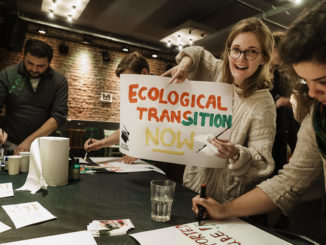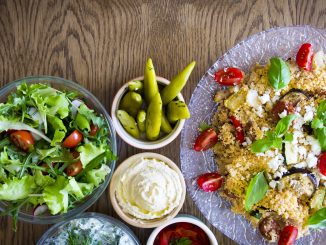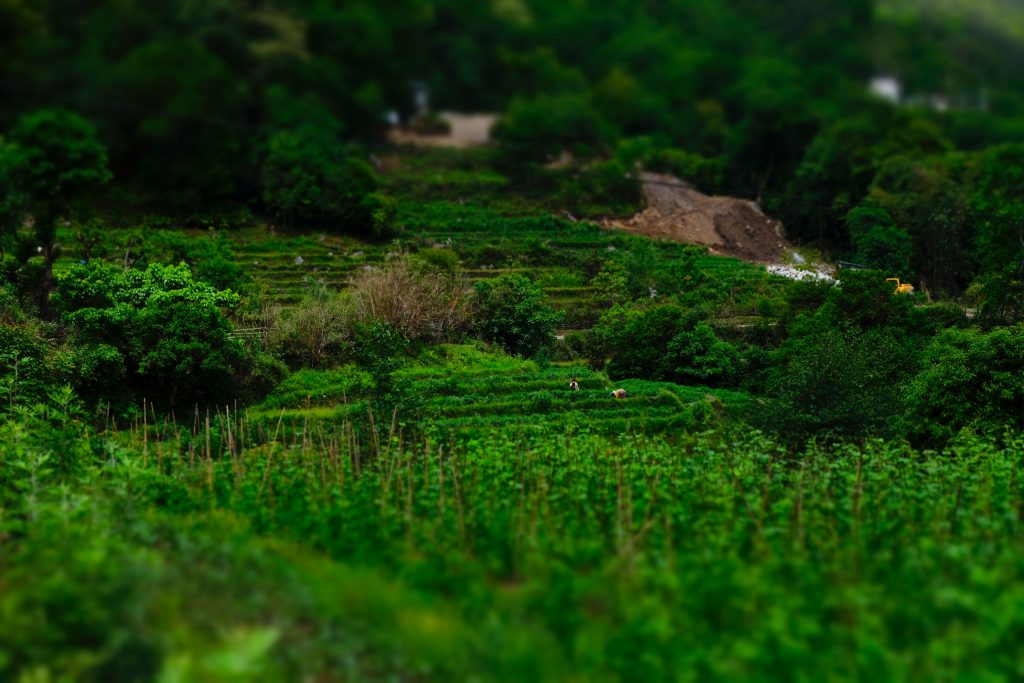
By Hannes Lorenzen and Adrian von Bernstorff
In the final part of this short series on Bhutan, Hannes Lorenzen teams up with Adrian von Bernstorff to examine how the Bhutanese economy is increasingly geared toward supporting food sovereignty and organic agriculture.
State of play: farming and food security in Bhutan
Bhutan’s ambition to become wholly organic has raised much attention among experts and policy makers worldwide. Conventional farming practices are increasingly facing scrutiny, especially in light of climate change, shrinking wild habitats and agricultural biodiversity, reduced soil fertility, and depleted water resources. More than ever, global cooperation is needed to enhance economically viable and resilient practices for farmers and sufficient and healthy food for all.
Bhutan has committed itself in numerous international agreements to protect its rich wildlife and biodiversity, and to reduce its greenhouse gas emissions radically. More than 60% of the country’s forest area is protected for all times to come. Bhutan is today with more than 70% forest cover the world’s only carbon-negative country, and strives to contribute even more to carbon sequestration by increasing its hydroelectric energy production. However, two of Bhutan’s important policy goals remain unmet: to achieve food self-sufficiency for the Bhutanese people, and to establish a resilient, productive organic farming system.
Despite the rapid modernization of Bhutan’s urban areas in the last decade, rural regions and communities have yet to claim their place in Bhutan’s development strategy. More than 60 % of Bhutan’s population continues to live in farming communities[1]. The Renewable Natural Resources (RNR) sector currently contributes 15.2 % to Bhutan’s Gross Domestic Product (GDP). However, such GDP-based metrics fail to take into account non-monetary and non-market-based benefits such as food security aspects of subsistence farming, non-monetary wellbeing and social capital, cultural identity, and religious values. As an example, mutual aid between neighbours and families during harvest time and home construction is very common in Bhutan but not reflected in GDP.
Conventional approaches to economic development measure primarily per capita income and “modernization” of farming. Food security is defined as increase of productivity per unit. Growth in output is expected by increasing farm sizes and livestock units and applying a wide range of chemical inputs and treatments to increase productivity, while decreasing human work force.
While this paradigm of agriculture and livestock development has reached impressive growth in crop and livestock yields and GDP, many countries now face costly and negative side effects of these practices. Natural resources are being depleted, rural regions are depopulated, and rural populations feel marginalized. The Organization for Economic Co-operation and Development (OECD), the European Union (EU) and the United Nations Food and Agriculture Organization (FAO) all point out the need to include externalized costs of conventional farming practices into the balance of GDP and consumer food prices, so as to account for the true costs of increased water and soil pollution, deteriorating public health, and the loss of wild habitats and biodiversity.
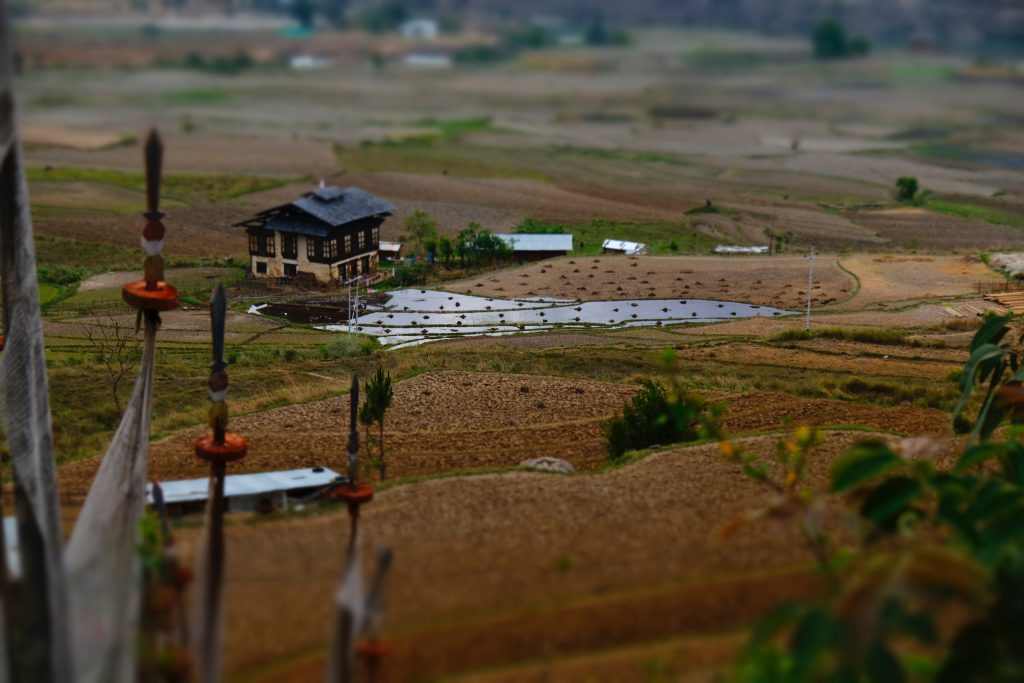
A paradigm shift in Bhutan’s farming communities
Against this background, Bhutan’s lineage of Monarchs, and since 2008 its democratically-elected policy makers, have consistently been cognizant of the risks that come with this conventional development paradigm. His Majesty the 4th King captured this sentiment in the late 1970s when he defined Bhutan’s development vision as the pursuit of a Gross National Happiness (GNH). Since that time, Bhutan has pursued the goal of becoming a “GNH society.” This vision includes also Bhutan’s farming sector. Experimental processes to promote organic farming began in 2003, followed by institutionalized programs promoted to implement the National Framework for Organic Farming for Bhutan (NFOFB) in 2007 and the establishment of the National Organic Program (NOP) in 2008. However, it seems that Bhutan’s stated vision to go wholly organic by 2020 will not yet be achieved[2], prompting calls for an open and honest discussion about the future of Bhutan’s farming and food policy.
The Ministry of Agriculture and Forests (MoAF) has adopted an Organic Masterplan in 2012, backed up by a roadmap for the 12th 5-year plan, which lays out Bhutan’s development strategy from 2018 to 2023. Currently a new Flagship Program for the development of the organic sector between 2018 and 2023 has been developed by the MoAF to be approved by the new cabinet. The goal of the Flagship Program is to improve the integration of the agriculture sector with its sub-sectors of livestock and forestry, and to enhance the production of safe and nutritious food and non-food products on a sustainable basis in environmentally clean production systems, while engaging rural population including women and youth in increasing production volumes for trade and improving productivity with better research and science based technology generation.
All of these efforts are built on the conviction that Bhutan has the potential to develop sustainable and organic farming and food systems. The use of agrochemical inputs in Bhutan is among the lowest in the world[3]. Making the final step towards sustainable, organic farming systems is believed to be much easier done here than in other countries. With Bhutan’s spiritual heritage, farmers thrive to live in harmony with nature. However, to become more productive to achieve domestic food security they need organic alternatives to chemical treatments. Most young people starting projects in the country’s RNR sector are passionate about organic farming. The authors are familiar with numerous such initiatives, including the “Youth in Agriculture Programme, Green Hands”, a group of graduates in Chukha, the “Druk Organic Farm”, the essential oils project “Kingdom Essences”, “Druk Metho”, a project in the Punakha Valley growing organic edible flowers or Kengrig Namsum Cooperative, an organic youth group in rural Zhemgang.
Bhutan is blessed with a wide range of climate zones in which a stunning genetic diversity of wild and cultivated food and non-food products can be grown or collected. Remarkably, this biological and genetic treasure is still in public hands, and is considered to belong to the people’s commons. Access to seeds and animal breeds are not restricted, and the country has preserved a wide range of open pollinated seed varieties, which carry high genetic diversity, making them particularly climate resistant, and appropriate for disease resistance breeding.
Gasa Dzongkhag region has been fully organic since 2004 and gained important experiences, which can help to inform the required nationwide debate about the future of Bhutan’s farming and food system.
Sikkim on Bhutan’s border to India has made the shift to organic farming, banning the import of agrochemicals in 2014, and certifying the entire arable land as organic. Sikkim’s approach provides its own challenges, which Bhutan should carefully analyse and learn from. Despite many efforts to translate the organic vision into reality, the results — so far at least — are still lagging behind ambitions. Bhutan’s attempt to encourage farmers to produce for the domestic and international market, so far only reached single cash crops such as potato, hazelnut and cardamom. Potato and cardamom harvests did increase household cash income in certain regions of the country. However, “single cash-crop approaches” could substantially reduce Bhutan’s agro-biodiversity, increase the risk of crop failure and deplete soil fertility. Especially potato and rice farming communities were apparently encouraged to significantly increase the amounts of chemical fertilizers and pesticides over the last couple of years. Without crop-rotation, the increasing use of chemicals is leading to accelerating soil depletion. In Phobjikha and other potato farming communities, the downward spiral is alarming – despite massive use of chemicals, the yields are even declining. At the same time, financial support to the National Organic Program has decreased substantially during the 11th 5-year plan, from Nu. 12.25 Million in 2012-2013 to Nu. 1.323 Million in 2016-2017[4].
Direct yield comparisons of organic with conventional farming methods have limited discussions to aspects of the “productivity gap” and lead to short-term political decision making in most countries around the world. The discourse needs to be broadened, taking a closer look at the goal of “food sovereignty” and long-term resilience. Going beyond food security, which usually focuses on availability, food sovereignty focuses on the maintenance and development of a country’s capacity to produce its basic foods respecting cultural and productive diversity[5]. It demands to localize food systems and give local producers better access to land, water, seeds and livestock breeds. Aspects such as food choice, food education and building upon traditional knowledge are included into this approach to resilient farming. Furthermore, food sovereignty requires the integration of a nation’s agriculture policy with other parallel priority agendas focusing on natural conservation, biodiversity, climate resilience, and efforts to combat rural poverty.
To achieve a sustainable food system in Bhutan, two major goals need to be pursued. First, subsistence farming practices need to be strengthened, not eradicated. Extension service providers and farmers should receive targeted training to be enabled to finding organic solutions to the problems they face. The well-established public RNR research and extension system in Bhutan, with specialized officers at Gewog level and RNR-Centers in various locations, has to be seen as a major opportunity to transform the farming sector. Organic farming is knowledge-intensive and only substantial efforts in capacity building of extension staff and lead-farmers can push organic farming at the grassroots level. Strengthening farmers’ vocational education will be key in supporting Bhutan to go organic. Participatory action research and innovation, farmer field schools, trainings and study tours within Bhutan, possibly to Sikkim, will foster opportunities to develop hands on solutions with farmers and researchers to establish locally adapted organic farming systems in Bhutan. This will allow farmers to continue producing enough for their families and communities without costly external inputs.
Secondly, Bhutan should actively support market-driven farming and food processing initiatives that specifically build on the rich local agro- and natural biodiversity. Such initiatives will allow young people with ambitions beyond subsistence farming to take a lead in the transformation of Bhutan’s agricultural economy. Rural enterprises and youth start-ups in the organic sector can provide meaningful employment and income for Bhutanese people.
Presently, farming still has an image problem among Bhutan’s youth: hard work, low paying and considered as “backward”. However, showcasing success stories which create jobs and raise added value in rural villages can contribute to increase interest in organic farming and related business opportunities. The production of healthy, ecologically-sound food and decent jobs in the organic sector could boost self-esteem of young rural people and so contribute to achieve food sovereignty of the country.
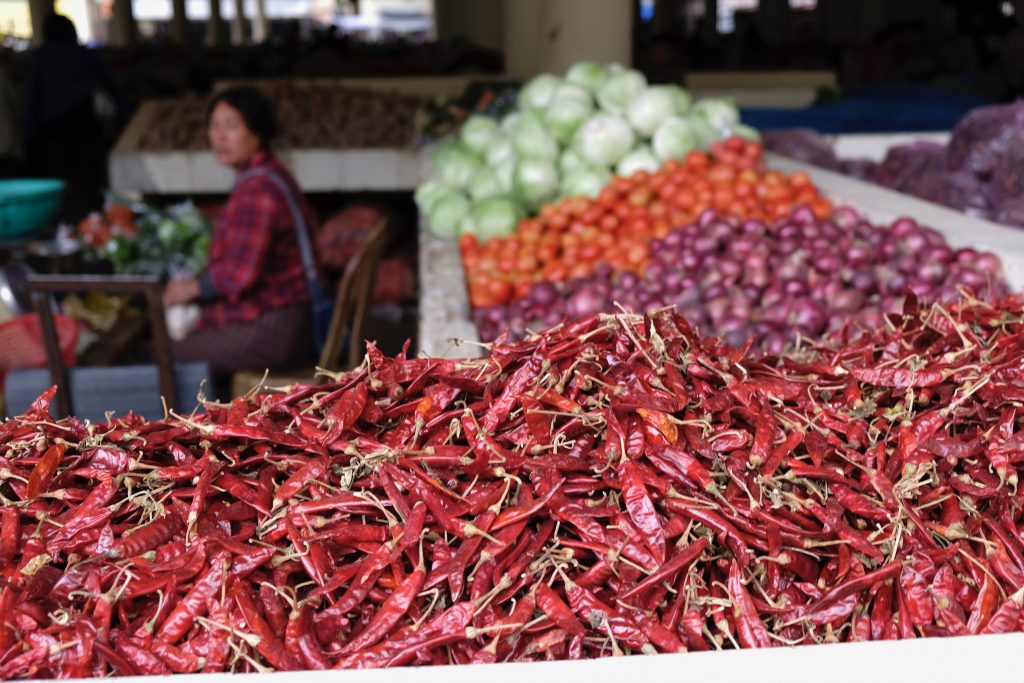
Sustainable land use
Due to its mountainous terrain and its strict policy of protecting its forest-cover, only about 8% of Bhutan’s surface area is considered arable land. Currently, only 3% of Bhutan’s land is being cultivated. The main reason is accelerated rural-to-urban migration. Furthermore, infrastructure, hotels and guesthouses servicing Bhutan’s fast-growing tourism industry are laying claim to much of Bhutan’s fertile rice producing valleys.
To avoid the loss of additional farmland, planners must give farmers the priority usage rights to the most fertile land for agricultural production, and strictly regulate the expansion of building and transport infrastructure. The User Right Certificate (URC) land reform initiative, administered by the National Land Commission, is a crucial step in the right direction, and has the potential to transform the entire farming sector. The purpose of this reform is to facilitate the allotment of state lands for agricultural and economic purposes in rural areas. Specific criteria for access to such public lands should include commitments by potential users that they refrain from using chemicals or artificial fertilizers, and that they prioritize organic farming systems.
Special attention should be given to the forestry sector, in particular to the increasing number of community forestry (CF) and non-wood forest product (NWFP) management groups in the country, which increasingly embark into income generating activities through the sale of their surplus forest products. Forest products, such as wild mushrooms, medicinal plants, lemon grass and others have shown high market and export potential and provide opportunities for rural enterprise development. Agro-forestry systems also provide substantial organic material for composting and other sources of energy and income for farmers and contribute to the development of the organic sector in Bhutan.
It is important to note, that organic farming refers to a holistic production system and is much more than just the abandonment of chemicals. An organic farming strategy has thus to target all MoAF sub-sectors equally, including balanced and resilient agriculture, livestock and forestry systems.
Potential of an Integrated Food Policy in Bhutan
Food security in Bhutan is carried by a variety of distinct policies and responsibilities in crop, seeds and livestock production, mechanisation and post-harvest services, forestry, processing and marketing. Furthermore, legislation and measures on environmental and biodiversity protection, climate mitigation and renewable energy need to be taken into account. The goals of improving public health and access to food especially for the poor also belong to the equation of attaining domestic food security.
In order to reach the objective of food sovereignty based on organic farming it seems important to create synergies between policies and strategies so as to make best use of Bhutan’s assets and ambitions.
An Integrated Food Policy would embrace four pillars of innovation:
– Integration of crop, livestock and agroforestry development strategies and extension services to achieve increased productivity through crop rotation, soil improvement, and animal husbandry on farm level;
– Integration of existing services in wild and biodiversity conservation with specific research, breeding and distribution of seeds and animal breeds fit for specific needs of organic farming;
– Coordinated public support for specific rural infrastructure and investments that support collection and processing of local food products apt for marketing and creating added value and jobs in rural communities;
– Coordinated public procurement policy which creates an efficient pull effect for the marketing of organic products to be served in public canteens, hospitals, schools, monasteries and tourist facilities, along with support of farmers markets on regional and local level.
The first pillar would be shaped to offer farmers support in improving their traditional practices with agronomic innovations including leguminous, cover and humus building crops and linking livestock with crop production to improve overall soil fertility. It would also improve the sustainability of the use of agroforestry resources for food production
The second pillar would tap into the rich genetic diversity of plant and animal reproductive material which is collected in Bhutan’s biodiversity and seed centres to develop a new organic breeding sector necessary for the organic transition.
The third pillar would focus on the specific rural infrastructure necessary to support transition, allowing public and private investors to boost value-added products which can be sold on the national and international market as organic high quality products.
The forth pillar would create initial demand for organic products through procurement programs which can be combined with public health and food education so as to create awareness about healthy diets and disease prevention.
All four pillars would need to be coordinated by a national task force which would guide the various services and actors towards the envisaged inter-service synergies. It would monitor progress made in transition from traditional to improved organic practices, processing and marketing facilities, breeding and public health programs.
With regard to the potential of agro-biodiversity in this context a national organic breeding program would concentrate on the many smaller domestic crops like the “nine national cereals” which could help overcoming dependence on rice and potatoes and could boost a process of diversification of food choice and farming resilience. Bhutan could become a place of innovation of organic breeding, which is only very slowly developing in western countries. Cooperation with breeders in this field could become the source of intensive cooperation and an emerging market for organic seeds and could provide very attractive opportunities for Bhutanese farmers and breeders.
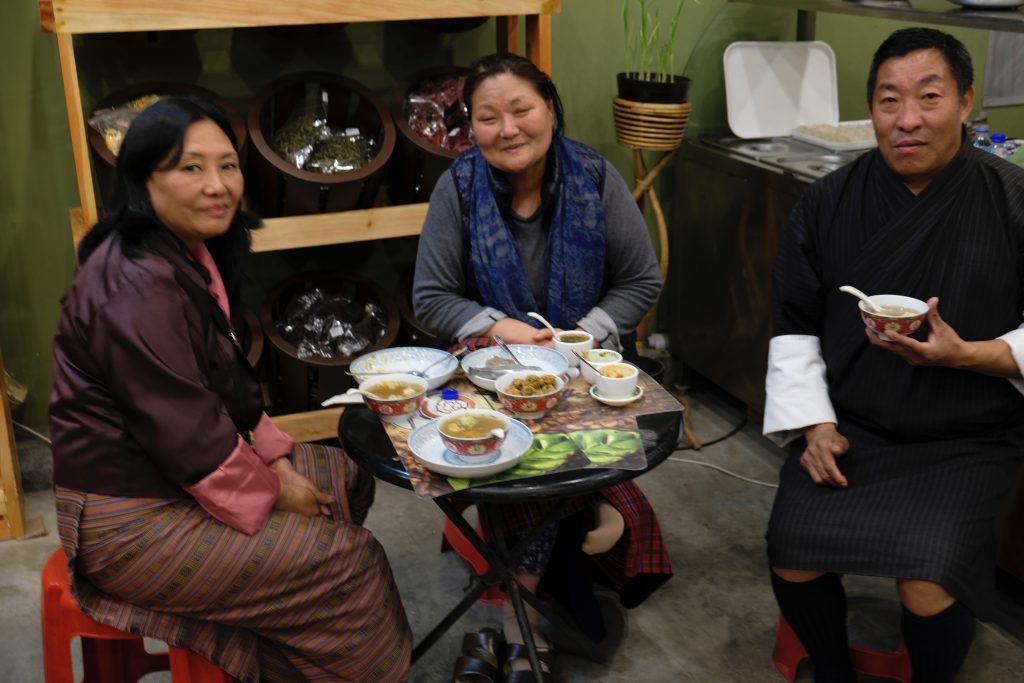
Qualified market development and export
Innovative businesses in Bhutan have already shown the way. Chuniding is one such producer and vendor of organic and natural food. Their success demonstrates how products based on local agro-diversity and knowledge can thrive in the local market.
The private sector must also play a role creating opportunities for farming communities. The tourism industry, as example, could play a lead role in severing tourists in hotels and restaurants with local organic food and in supporting initiatives of local farm produce souvenirs in contrast to the increasingly available imported products. In addition, a strong commitment by the tourism sector in the development of farm- and ecotourism will also contribute to a paradigm shift and the development of organic farming in the country.
The image Bhutan enjoys globally as responsible guardian of its natural treasures and cultural heritage offers export opportunities. Consumers in Asia and Europe demand high value-added organic products that can be tracked to the source. Bhutan’s products could be branded as a source of happiness. However, the country would risk to quickly lose this reputation, if this image did not match with reality. The development and enforcement of quality standards will be key to prevent exploitation of Bhutan’s image for private gain. Building authentic and farmer-centric value chains is one aspect of qualifying exports toward foreign markets.
To prevent the creation of a false image it could help focussing on “branding the quality process” of Bhutan’s ambition to offer true food happiness to all. In this environment a scene of socially and environmentally conscious processors has emerged looking to invest into this project. Such conscientious processors can play a key-role in transforming Bhutan’s farming sector and provide crucial know-how.
An established example of such a partnership is Bio Bhutan, which has been exporting Lemon Grass Oil primarily to Germany. At the same time, Primavera has provided know-how to Bio Bhutan for the development of value-added products for the local market.
The manufacturer Druk Metho produces organic edible flowers for “Swiss Alpine Herbs”, which are low in volume and high in value and all of which are native to Bhutan. Swiss Alpine Herbs is providing pro bono know-how, which allows Druk Metho to develop products for the local tourism and gastronomy markets. The export is therefore only a starting point to bring resources and knowledge into the project, but the end goal is an independent and resilient local farming system.
Opportunities like this could be attractive for many Bhutanese enterprises, provided that the projects are farmer-centric, biodiversity is nurtured and the independence of the farmers is maintained.
Conclusion
Increased amounts of chemicals have been provided to farming communities over the last couple of years in Bhutan, without improvement of food security. At the same time, resources for the National Organic Program have been reduced significantly during the 11th 5-year plan. This development may undermine the mentioned objectives to reach food sovereignty and the declared move towards organic production since increased chemical use in mono-cropping farming systems will cause fast depletion of soils, loss of biodiversity and loss of traditional farming know-how.
Yet, Bhutan has maintained the opportunity to achieve “food sovereignty” and its organic vision by strengthening the subsistence farming system and carefully developing market driven, farmer-centric approaches to farming. This will require a focus on synergies between agricultural, rural- and sustainable development goals through a well-coordinated effort, including public and private stakeholders. A multi-sectoral approach involving public-private partnerships and a supportive civil society can transform the farming system in Bhutan. The first crucial step will be the adoption of the “Flagship Program for Organic Sector Development” to strengthen the National Organic Program and bring urgently needed support to Bhutan’s organic farmers. Conflicting objectives and missing synergies across different policies influencing the farming system could be brought together in a newly developed “Integrated Food Policy”. Effective rules and regulations are needed to support a paradigm shift in the country’s farming systems. The qualified development of local and international market opportunities, farm related research, extension and capacity building and innovative spirit towards organic farming can attract youth into farming and associated value chains and so revive rural communities.
A strong commitment and action plan to develop agro-ecological and organic farming systems will also mobilize international attention and resources required to achieve this transformation.
This article first appeared in The Druk Journal: Transforming Bhutan’s Economy, Volume 4, Issue 2, Winter 2018
[1]Statistical Yearbook of Bhutan 2018, page 4
[2] Organic Agriculture Development Strategies: Roadmap for 12th Five Year Plan and Beyond, April 2018, page viii
[3] Ibid.
[4] Ministry of Agriculture and Forest, Department of Agriculture, Revised Budget for the Fiscal Year 2012-2013 and for the Year 2016-2017
[5] Food Sovereignty and Food Security: Where does Africa stand? Forum for Agricultural Research in Africa, 2014 page 10
 Adrian von Bernstorff is the Director of the Entrepreneurialism Clinic (EC) at the Jigme Singye Wangchuck School of Law, training Bhutan’s future lawyers in the practical application of law in the field of entrepreneurship. Organic farming and associated value chains are a focus area of the EC. Adrian was raised on a progressive and organic family farm in Germany. After his study of law at the University of Freiburg and the University of Hamburg, Adrian practiced at the law-firm “Becker Büttner Held Berlin” in the field of renewable energies. He lives in Bhutan with his family since 2013 and worked as consultant of an agricultural cooperative and Managing Director of an agricultural business, before joining the Law School. He sees in Bhutan´s unique farming culture the potential to develop a vibrant local economy.
Adrian von Bernstorff is the Director of the Entrepreneurialism Clinic (EC) at the Jigme Singye Wangchuck School of Law, training Bhutan’s future lawyers in the practical application of law in the field of entrepreneurship. Organic farming and associated value chains are a focus area of the EC. Adrian was raised on a progressive and organic family farm in Germany. After his study of law at the University of Freiburg and the University of Hamburg, Adrian practiced at the law-firm “Becker Büttner Held Berlin” in the field of renewable energies. He lives in Bhutan with his family since 2013 and worked as consultant of an agricultural cooperative and Managing Director of an agricultural business, before joining the Law School. He sees in Bhutan´s unique farming culture the potential to develop a vibrant local economy.



